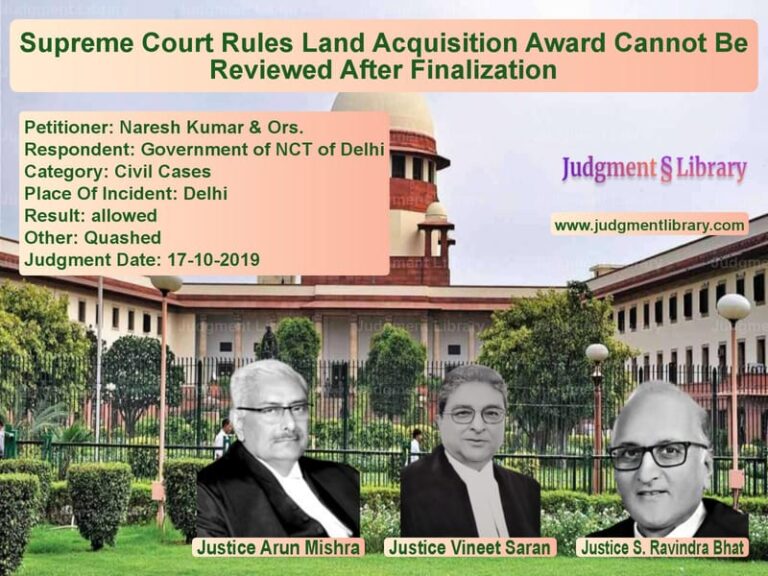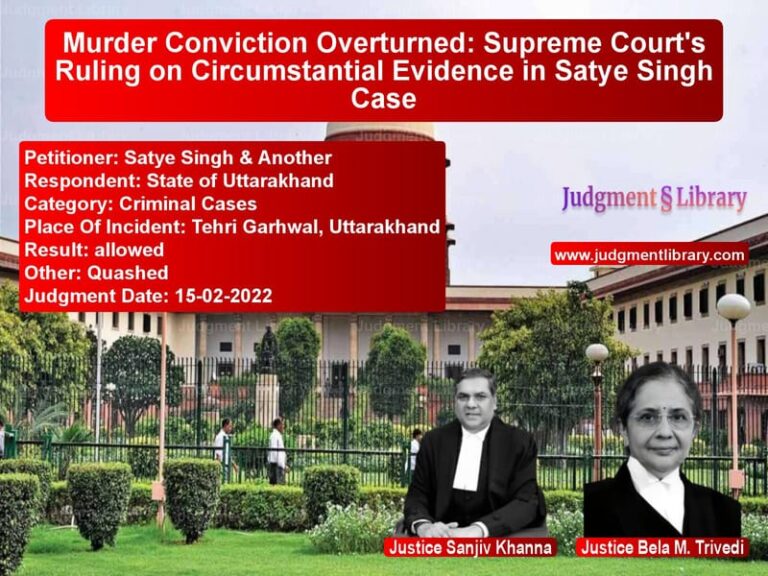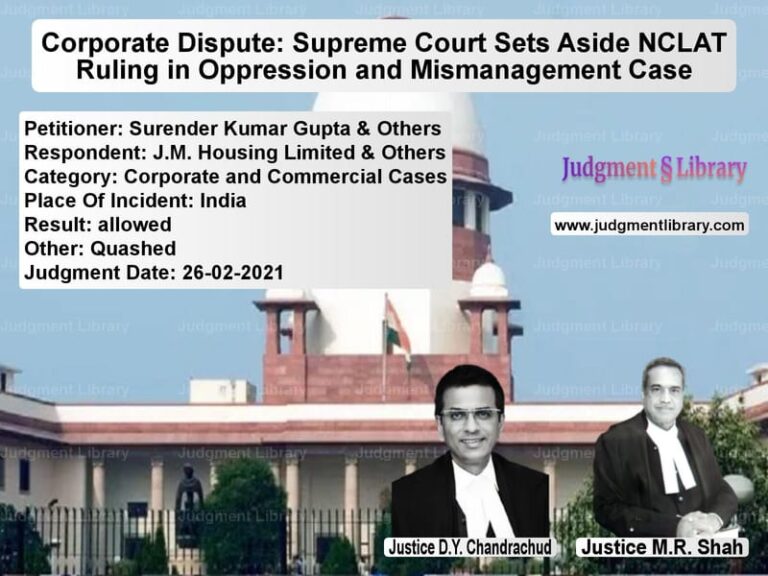Interpreting Section 148 of NI Act: Supreme Court Clarifies Appellate Courts’ Powers
The case involving Muskan Enterprises and the State of Punjab highlights significant judicial interpretations concerning the Negotiable Instruments Act, specifically Section 148. The issue arose when Muskan Enterprises and its proprietor faced conviction under Section 138 of the Negotiable Instruments Act for dishonour of a cheque. The trial court in Amloh, Fatehgarh Sahib, had sentenced the proprietor to rigorous imprisonment for two years and imposed a substantial compensation amount.
Facts of the Case
The dispute originated when Muskan Enterprises, represented by its proprietor, was convicted by the Judicial Magistrate, 1st Class, Amloh, Fatehgarh, Punjab, for issuing a cheque that was dishonoured due to insufficient funds. Alongside the conviction under Section 138 of the Negotiable Instruments Act, the appellants were sentenced to two years of rigorous imprisonment and directed to pay compensation amounting to Rs.74,00,000, double the cheque amount involved.
The appellants filed an appeal against this conviction before the Sessions Court at Fatehgarh Sahib. In admitting the appeal, the Sessions Court suspended the sentence but mandated a deposit of 20% of the compensation amount awarded by the trial court. This condition of deposit was imposed pursuant to Section 148 of the Negotiable Instruments Act. The complainant was permitted to withdraw this deposit subject to certain conditions.
Challenging the Deposit Condition
Dissatisfied with this directive, the appellants moved the High Court of Punjab and Haryana, invoking Section 482 of the Criminal Procedure Code (Cr. PC), challenging the mandatory nature of this 20% deposit. At the time, the High Court was guided by the ruling of the Supreme Court in Surinder Singh Deswal @ Col. S. S. Deswal v. Virender Gandhi, which deemed the deposit condition mandatory under Section 148 of the N.I. Act. Recognizing the binding nature of this precedent, the appellants withdrew their petition.
Subsequently, the Supreme Court, in another crucial judgment (Jamboo Bhandari v. Madhya Pradesh State Industrial Development Corporation Ltd.), offered a new interpretation. The Court ruled:
“Normally, the Appellate Court will be justified in imposing the condition of deposit as provided in Section 148. However, in a case where the Appellate Court is satisfied that the condition of deposit of 20% will be unjust or imposing such a condition will amount to deprivation of the right of appeal, an exception can be made for the reasons specifically recorded.”
Inspired by this clarification, Muskan Enterprises approached the Punjab and Haryana High Court again under Section 482 Cr.PC, contending that their situation warranted an exception to the deposit rule. However, the High Court dismissed their second petition on technical grounds, stating that since their earlier petition had been withdrawn without permission to file afresh, the new petition was not maintainable.
Key Legal Issues Before the Supreme Court
The central question before the Supreme Court was whether the dismissal of the second petition by the High Court, citing procedural grounds, was legally justified. Specifically, the issue was whether the appellants required explicit permission from the High Court to file a second petition under Section 482 of the Criminal Procedure Code.
Supreme Court’s Legal Analysis and Decision
The Supreme Court began by differentiating the procedural frameworks of criminal and civil proceedings. It explicitly clarified that principles such as res judicata, common in civil cases, do not apply similarly in criminal matters. Relying on earlier judgments including S.M.S. Pharmaceuticals Ltd. v. Neeta Bhalla and Jamboo Bhandari v. Madhya Pradesh State Industrial Development Corporation Ltd., the Court noted:
“The legal position as to whether a second petition under Section 482 CrPC is maintainable is no longer res integra. There is no bar for a second petition under Section 482 CrPC, especially when there is a significant change in circumstances or law.”
The Court emphasized that the new interpretation in Jamboo Bhandari constituted a vital legal development, justifying the appellants’ second approach to the High Court. The Supreme Court held that the High Court had erred in dismissing the subsequent petition merely on procedural grounds without assessing the substantial change in legal position.
Interpreting Section 148 of NI Act
Addressing the scope and application of Section 148 of the NI Act, the Supreme Court provided crucial clarifications, stating:
“The verb ‘may’ used in Section 148 NI Act implies discretion; Appellate Courts retain the discretion to order or waive the 20% deposit requirement. If the legislature intended a mandatory deposit, the word ‘shall’ would have been consistently used. Hence, courts have discretion, provided they explicitly record reasons for any exceptions made.”
This decision effectively overruled the previously strict interpretation provided by the Surinder Singh Deswal judgment. It introduced a balanced approach, giving appellate courts discretion in exceptional circumstances where mandatory deposits could cause undue hardship or injustice.
Conclusion and Final Outcome
The Supreme Court ultimately ruled in favour of Muskan Enterprises, setting aside the High Court’s dismissal of the second petition and remanding the matter to the Sessions Court for reconsideration. The Sessions Court was directed to reconsider the necessity of the 20% deposit based on the clarified legal interpretation provided by the Supreme Court, specifically noting:
“Justice would be sufficiently served if the Sessions Court re-examines the issue of deposit in light of the clarified legal position in Jamboo Bhandari v. Madhya Pradesh State Industrial Development Corporation Ltd.”
This ruling highlights the importance of judicial discretion in interpreting statutory provisions and ensures that appellate remedies remain accessible and fair for litigants under financial distress.
Petitioner Name: MUSKAN ENTERPRISES & ANR..Respondent Name: THE STATE OF PUNJAB & ANR..Judgment By: Justice DIPANKAR DATTA, Justice PRASHANT KUMAR.Place Of Incident: Punjab.Judgment Date: 18-12-2024.
Don’t miss out on the full details! Download the complete judgment in PDF format below and gain valuable insights instantly!
Download Judgment: muskan-enterprises-&-vs-the-state-of-punjab-supreme-court-of-india-judgment-dated-18-12-2024.pdf
Directly Download Judgment: Directly download this Judgment
See all petitions in Cheque Dishonour Cases
See all petitions in Debt Recovery
See all petitions in Damages and Compensation
See all petitions in Contract Disputes
See all petitions in Judgment by Dipankar Datta
See all petitions in Judgment by Prashant Kumar
See all petitions in partially allowed
See all petitions in Remanded
See all petitions in supreme court of India judgments December 2024
See all petitions in 2024 judgments
See all posts in Civil Cases Category
See all allowed petitions in Civil Cases Category
See all Dismissed petitions in Civil Cases Category
See all partially allowed petitions in Civil Cases Category







